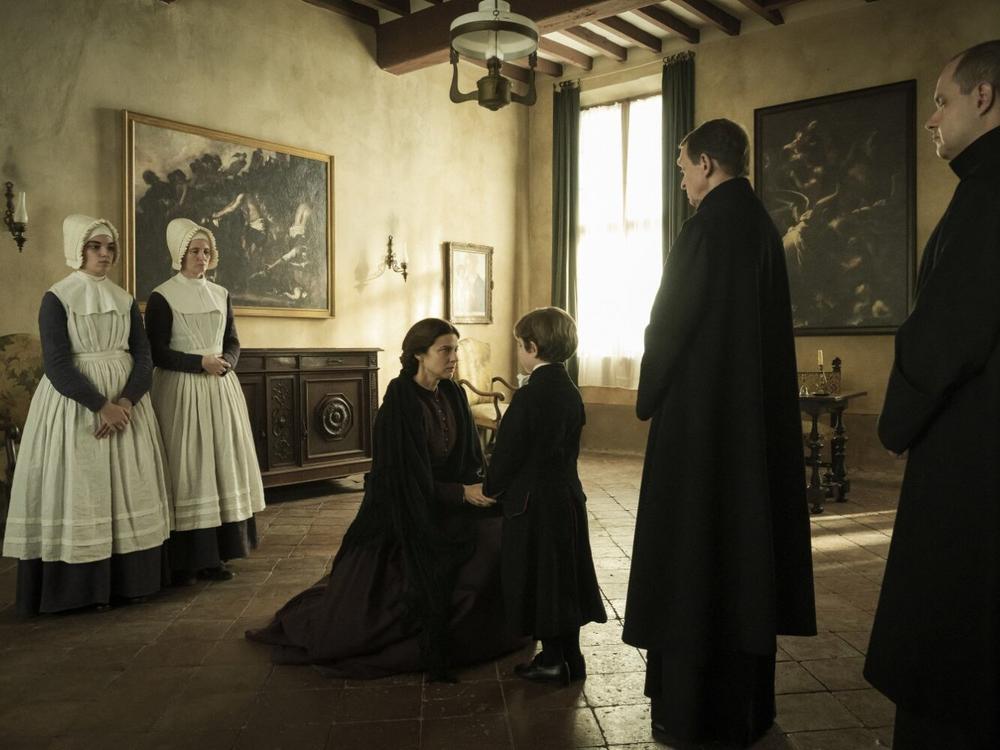Section Branding
Header Content
'Kidnapped' tells the historical horror story of an abducted Jewish child
Primary Content
We’re living through days of powerful, often violent religious feeling — stories that might have felt like old dead history now take on a stinging new relevance.
That’s the case with Kidnapped: The Abduction of Edgardo Mortara, the ferocious true story of a young Jewish boy forcibly taken from his parents by emissaries of the Pope in 1858. It was made by Marco Bellocchio, the great Italian filmmaker who first burst on the scene 59 years ago with his scorched-earth debut Fists in the Pocket.
Now 84 but still far from mellow, Bellocchio takes us back to the 19th century to tell a historical horror story steeped in Roman Catholic antisemitism.
The action begins in 1850s Bologna, which was then under the rule of the unpopular and highly conservative Pope Pius IX. The just-born Edgardo is the sixth son of a Jewish Bolognese family, whose housemaid, unbeknownst to them, baptizes the baby to save his soul.
When the Church’s inquisitor in Bolgona learns of this baptism six years later, he declares Edgardo a Christian. And because it’s illegal for non-Christians to raise a Christian child, he grabs the 6-year-old boy away from his agonized parents and ships him to Rome. There, as he yearns for his mother, Edgardo’s put into a boarding school for the children of converted Jews, where he’s surrounded by images of the crucifixion.
Naturally Edgardo’s parents are shattered and do everything they can to get him back — even waging a huge international PR campaign. Going to Rome, they make heartrending appeals to stony-faced priests who say they understand their sadness but can do nothing to alleviate it. After all, they are helping the boy become a proper Christian.
To avoid seeming politically weak, Pius IX refuses the world’s calls for Edgardo’s freedom. In fact, he doubles down on the kidnapping, personally guiding the boy’s Catholic education and having him baptized a second time.
Although Kidnapped is a straightforward historical drama about religious oppression, Edgardo’s tale is filled with startling twists and turns, especially when, in 1860, nationalist rioters overthrow Pius IX’s rule in Bologna. With new people in charge, the Bologna inquisitor is arrested for the kidnapping and we see how Edgardo has fallen through one of the trap doors of history. Had he simply been born a few years later, he wouldn’t have been taken from his Jewish home and forcibly made a Christian.
Even as the rebels go after the pope, we keep worrying about Edgardo’s fate in Rome. What happens to a young Jewish boy who’s cut off from his family and trained not just to be a good Catholic but to become a priest? What core of the original Edgardo remains? Who does he become as he moves into manhood? The answers are unsettling.
Now, at moments Kidnapped feels old-fashioned. Yet Bellocchio never falls into boring costume drama realism. Working in a painterly style, he pushes things toward the operatic — laying on surging music and endowing Edgardo with innocent good looks that border on the angelic. Actor Paolo Pierobon plays Pope Pius as a kind of opera buffa figure, hammy in a Marlon Brando sort of way — at once silly and creepy and sinister. In one of the film’s best scenes, Edgardo has a hallucinatory encounter with a crucifix that directly answers the falsehood that the Jews killed Christ.
Like me, Bellocchio was raised a Roman Catholic and is clearly appalled by the Church’s cruelty to the Mortara family and to all Jews, whom they treated as inferiors who must literally kiss the pope’s feet for decent treatment. He wants us to be appalled and angry, too.
Yet what gives the movie its timely resonance is not merely its depiction of antisemitism but what it shows about the dangerous politics of religious belief. Although religion officially deals in timeless universal truths, Kidnapped reminds us that these timeless universals are always bound up with historical questions of power. And where there’s power, there will be abuse.

